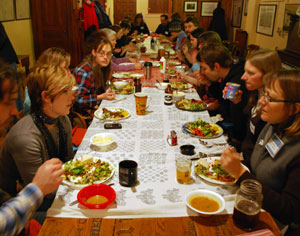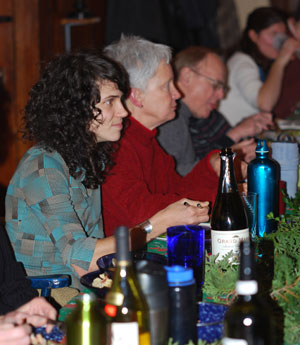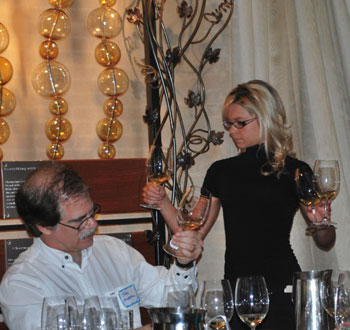City Notifies Selma Cafe of Zoning Violation
The city of Ann Arbor has sent a notice of zoning violation to the popular Selma Cafe, a weekly home-based breakfast gathering that raises money for local farmers and farming activities.

A map posted earlier this year on the Selma Cafe website aimed to address parking and traffic concerns in the neighborhood.
The group has also received notice that the nonprofit Food System Economic Partnership (FSEP) has decided to end its fiscal sponsorship of Selma Cafe, citing “significant violations” of the terms in a memorandum of understanding between the two entities. The FSEP board voted to make the move in late March.
But it’s the zoning violations that could force a dramatic change in Selma Cafe, which often draws more than 200 people to the home of co-founder Lisa Gottlieb, located near Eberwhite Elementary School. The letter, dated April 3 from city planning manager Wendy Rampson, notes that home occupations are allowed in residential areas, but with certain restrictions. The letter states that Selma Cafe violates those restrictions in three ways: (1) more people are involved in the operation than are allowed under city code; (2) more than the permitted 10 vehicle trips per day are generated; and (3) the need for parking is not being met.
Reached by phone on Friday, Gottlieb said she plans to hand-deliver a response to the city on Monday. She believes the parking, traffic and congestion issues are resolved, and she is actively pursuing two other locations as possible venues for the weekly breakfasts. She disagrees with the city’s interpretation of the code, noting that Selma Cafe is not a business and the people who work there are volunteers, not employees. Although she hopes to continue holding the breakfasts, she said at this point it’s unclear how things will play out and whether that will be possible.
Gottlieb noted that one neighbor had criticized Selma Cafe for bringing thousands of people to the neighborhood since they started in 2009. Although the neighbor had cited that as a negative thing, Gottlieb said to her it seemed “pretty incredible” that the effort had been able to engage so many people in raising money for the local foodshed, keeping money in the community and helping local farmers.
Regarding the issues raised by FSEP, Gottlieb explained that she had withdrawn funds from the FSEP-managed bank account to transfer into a new account created as Selma Cafe transitions to become an independent 501(c)3 nonprofit. She had not first informed FSEP of the withdrawal, as required under terms of the memorandum of understanding. Even if that had not occurred, she added, “the fact is they wanted to be done with us.”
Obtaining the nonprofit status is taking longer than anticipated, so Selma Cafe is seeking another fiscal sponsor. Until that happens, the funds for Selma that remain in the FSEP-managed account – which total about $40,000 – are frozen. If no new fiscal sponsor is found and Selma does not obtain its 501(c)3 designation by May 31, FSEP could take the Selma assets permanently, under terms of the MOU. If that happened, FSEP would need to allocate those funds “in any manner consistent with applicable tax and charitable trust laws and other obligations.” [Full Story]









